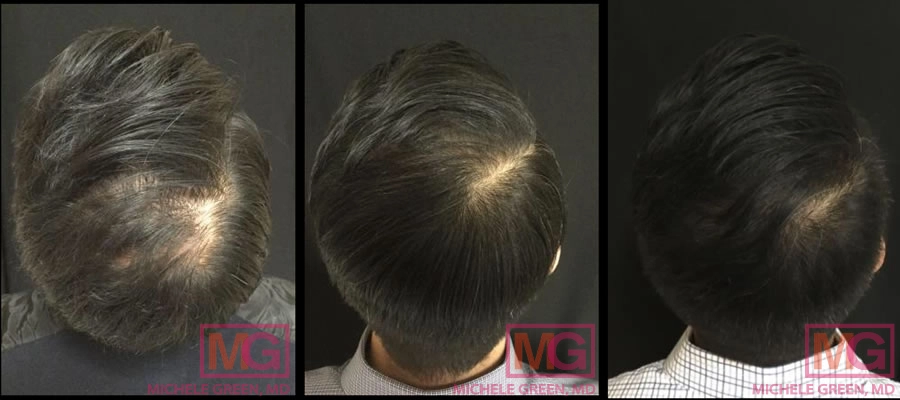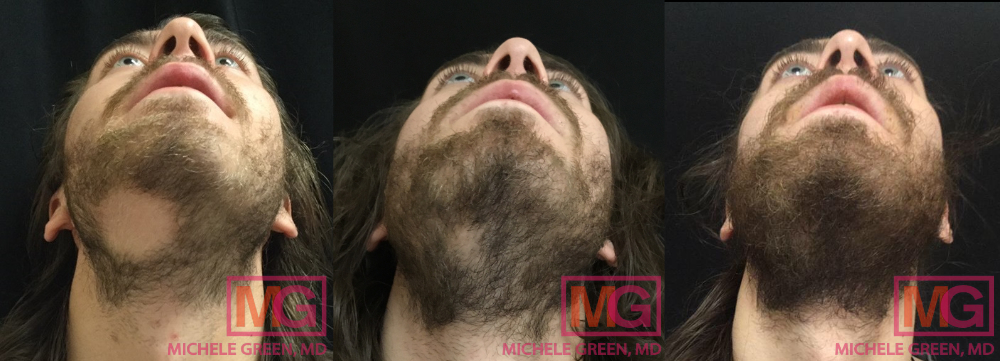Michele S. Green M.D., FAAD., is a Board-Certified Cosmetic Dermatologist, Fellow of the American Academy of Dermatology, and has been an international leader in cosmetic dermatology for over 25 years. Upper East Side patients and those around the globe flock to her practice for cosmetic dermatology treatment. A graduate from Yale University, with an MD and Chief residency from The Mount Sinai School of Medicine in NYC, Dr. Green treats some of the most discerning, demanding women and men in the world, with issues ranging from premature skin aging to hyperpigmentation, rosacea, wrinkles, acne, skin laxity, hair loss, and sun damage.
 Photo Credit: Courtesy of Dr. Michele Green
Photo Credit: Courtesy of Dr. Michele Green
What is Male Pattern Hair Loss?
Male pattern hair loss, also known as androgenic alopecia is a common medical condition in which there is increased shedding that results in a receding hairline, thinning hair, and baldness. According to the American Hair Loss Association, over 65% of men will experience hair loss at some point in their lives, with around 85% of men experiencing thinning or balding. Board-certified dermatologist and Haute Beauty expert Dr. Michele Green has over 25 years of experience in male pattern baldness and has been at the forefront of innovation in treating thinning hair.
What is the Cause of Male Hair Loss?
Multiple factors contribute to hair loss from stress to diet to genetics. Male pattern hair loss is also associated with androgens, a sex hormone that is particularly tied to hair growth, hence the name androgenetic alopecia. The major androgen that contributes to hair loss is dihydrotestosterone (DHT).
Men with androgenic alopecia have increased levels of androgen hormones in their bodies like dihydrotestosterone (DHT). DHT leads to the shrinking of the hair follicle, which causes the hair to become weaker and shortens the hair’s life span. Eventually, the hair follicle may stop producing any hair at all, leading to bald spots and baldness.
Male pattern hair loss can also be triggered by certain lifestyle habits, such as intense amounts of stress or poor emotional health. After undergoing a stressful event, you might get acute telogen effluvium. In a normal healthy person’s scalp, around 85 percent of our hair follicles are in a growth phase (anagen) and 15 percent are in a resting phase (telogen). When you experience a shock, up to 70 percent of your hair follicles can go into a resting (telogen hair) state. If you are perpetually stressed, you may experience chronic telogen effluvium and hair loss over a longer period. To improve healthy hair after an incidence of telogen effluvium, it’s best to pinpoint what stressors may have triggered the response and to focus on healthy habits like proper hydration and adequate sleep.
Additionally, diet can affect overall hair health. Patients who have lackluster diets often miss out on the nutrients that help to support healthy hair growth. Be sure to consume fatty fish, eggs, leafy greens, fruit, and nuts in your diet to promote healthy hair growth. Additionally, protein powders or excess testosterone sources found in bodybuilding supplements can make hair loss worse by stimulating further sensitivity to androgens. Current clinical research suggests that creatine supplements can increase dihydrotestosterone in the bloodstream, which can, in turn, lead to weakened hair follicles.
 Photo Credit: Courtesy of Dr. Michele Green
Photo Credit: Courtesy of Dr. Michele Green
Can Male Hair Loss be Prevented?
Male pattern hair loss is genetic and therefore can develop even with preventative measures, such as:
- Adjusting your diet and nutrition: This can help stave off rapid hair loss. A diet rich in antioxidants can help fight the signs of oxidative stress which damages hair follicles. Foods rich in antioxidants include berries, legumes, and leafy green vegetables like kale and spinach. Foods that contribute to oxidative stress include sugar, processed fats, preservatives, and alcohol.
- Add nutrients to your diet: Nutrients like zinc, iron, and B vitamins are beneficial for hair health so if you have nutritional deficiencies in these areas, be sure to get adequate amounts of them either through your diet or through supplements.
- Treat your remaining hair well: Try to use a shampoo that is mild and suited for your hair to avoid unnecessary damage to your hair. Some hair care products contain harsh ingredients that can be extremely detrimental to your hair health. High-heat hair styling tools like hair dryers can also damage your hair by leaving your hair follicle dehydrated and vulnerable to damage. Also, avoid chemically treating or bleaching your hair.
How Can Male Hair Loss be Treated?
The key to successful treatment of hair loss and hair thinning is in identifying the underlying cause of your hair loss and addressing it appropriately. Thankfully, Dr. Green has a myriad of cosmetic and medical treatments available which can improve hair growth and prevent further hair loss.
Medically approved treatment options often include topical hair serums like minoxidil (Rogaine), topical Propecia, and oral medications like Propecia (finasteride). Additional medications and treatments include dutasteride, Platelet Rich Plasma injections (PRP), steroid injections, and the Laser Cap. Dr. Green also has her own line of specially formulated hair serums that have yielded significant results in encouraging hair growth for patients with male pattern baldness.
 Photo Credit: Courtesy of Dr. Michele Green
Photo Credit: Courtesy of Dr. Michele Green
What is Oral Minoxidil for Hair Growth?
Oral Minoxidil is a long-lasting solution for hair loss conditions. Minoxidil is a medication that was created to be prescribed for hypertension and high blood pressure that was found to have positive effects when it comes to hair growth. When Minoxidil was first developed for dermatological use, it was only available in a topical form. However, recently a new, low-dosage form of oral Minoxidil has been developed to combat hair loss from a variety of conditions, including androgenetic alopecia, telogen effluvium, and alopecia areata.
It takes several months of taking Oral Minoxidil as prescribed before the full effects of the treatment become visible. At the low dosage, oral Minoxidil can be taken long-term in order to maintain hair-strengthening results. As such, patients should expect to be prescribed oral Minoxidil for as long as they want to see the effects of the treatment.
What is Oral Finasteride (Propecia) for Hair Growth?
Oral finasteride, known commonly as Propecia, is an FDA-approved prescription medication for hair loss treatment. It is one of the most reliable and effective treatments that has been shown to improve hair regrowth in adult males. Propecia works by blocking the conversion of testosterone into dihydrotestosterone (DHT) in the body. This results in lower levels of DHT and therefore stops and prevents more follicular damage caused by DHT.
Many men who take finasteride notice improvements after three to four months of regular usage, although final results may take up to a year to see. Finasteride is often used in conjunction with minoxidil, as studies have shown that they are more effective in stimulating hair growth when used together.
 Photo Credit: Courtesy of Dr. Michele Green
Photo Credit: Courtesy of Dr. Michele Green
Is PRP Effective For Male Pattern Baldness?
PRP is a practical solution when you are looking for a natural method for stimulating hair growth. PRP entails collecting a sample of the patient’s own blood, spinning it in the centrifuge to separate the plasma from the red blood cells, and injecting the plasma into the scalp to improve the health of hair follicles. This process helps encourage new hair growth and promotes increased retention, leading to decreased hair loss and hair thinning. When used in conjunction with the right topical treatments, oral medications, and other innovative treatment modalities, PRP produces incredible results and thicker, healthier hair that lasts.
How Can You Get Started with Treatments for Male Hair Loss today?
If you’re hoping to delay male pattern baldness and reverse the signs of hair loss, Dr. Green in NYC can help. Dr. Michele Green is an internationally renowned board-certified cosmetic dermatologist and is known to be one of the best dermatologists in New York. Dr. Green has been consistently voted as one of the “Best Doctors” by Castle Connelly, New York Magazine, Super Doctors, and The New York Times as a pioneer in the field of cosmetic and medical dermatology. Please call the office today at 212-535-3088 or contact us online to schedule a consultation if you are dealing with hair loss and are interested in learning more about Dr. Green’s personalized approach to hair loss treatment.
For more information, visit Dr. Brian A. Levine's social media:

























